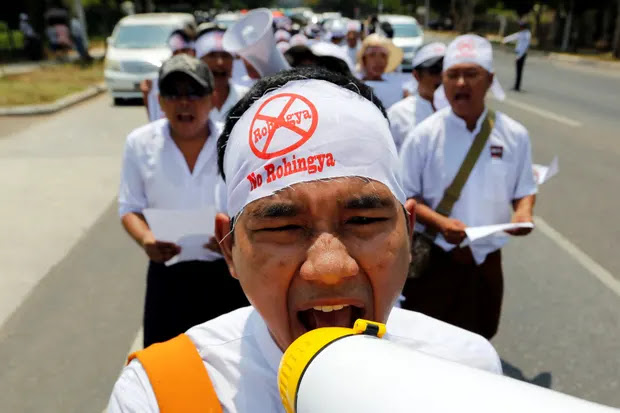Among a litany of long-standing challenges facing a new NLD-led government, addressing religious nationalism will be among the most sensitive and demanding.
 |
The people of Myanmar are euphoric at the landslide victory won by the opposition National League for Democracy (NLD) in a Nov. 8 general election deemed to be the freest and fairest since 1990.
As Nobel laureate Aung San Suu Kyi’s party has received more than enough parliamentary seats to select a president of their choice and form government, many are already beginning to dream of a better future ahead.
There is widespread optimism that an NLD-led government will ensure more democratic reforms, respect the public’s will and attract more international support. However, the people of Myanmar should not get over-excited about the country’s prospects over the next five years.
This is not yet a happy ending but rather the start of another episode. The new government will inherit a package of political time bombs—unresolved, contentious and sensitive issues.
There are a litany of long-standing challenges: civil war, poverty, corruption, federalism and the ongoing political role of the military.
Rising religious nationalism will arguably be among the most sensitive to address. In particular, the issue of the stateless Rohingya remains as charged and intractable as ever.
The new government will face twin pressures; from rights groups and Western governments on the one hand, and from its own people, including anti-Muslim nationalist groups. As the ruling party, the NLD will have to balance these competing expectations.
Since the first wave of communal violence broke out between Buddhist Rakhine and Muslim Rohingya in Rakhine State in 2012, the incumbent government has been under pressure from the international community to protect the Rohingya population. Subsequent bouts of anti-Muslim violence have since occurred in other parts of the country.
There have been accusations that some figures associated with Thein Sein’s government helped orchestrate anti-Muslim violence as part of a plot designed to defeat the NLD at the polls in 2015. This theory posits that by encouraging anti-Muslim sentiment and portraying the NLD as a pro-Muslim party, the government could paint themselves as protectors of the Buddhist faith, diverting popular support from the opposition.
In the months leading up to the election, leaders of the ultranationalist organization known locally as the Ma Ba Tha, overtly attacked Suu Kyi and her party for failing to support the “Race and Religion Protection Laws”—four bills pushed by the group to “protect” the country’s Buddhist Burmese character and which are widely viewed as discriminatory toward Muslims and other minorities.
Ma Ba Tha aligned monks were among those who called on the public not to vote for the NLD because the party was supposedly pro-Muslim.
Whenever Thein Sein and other officials insist the Rohingya are not citizens of Myanmar, they are greeted with widespread cheers from nationalists. Suu Kyi herself has been silent on the issue; presumably a political calculation ahead of the election.
Despite a constitutional provision outlawing the use of religion for political purposes, Union Solidarity and Development Party (USDP) members could be heard on the campaign trail courting voters with assurances that only they could protect race and religion. Perhaps were it not for the people’s profound disgust at the ruling party’s dismal human rights record, the NLD wouldn’t have won such a resounding victory.
On Sunday, Nov. 8, the majority of Burmese voted for the NLD despite the USDP’s smear campaigns; not necessarily because they do not hold concerns over the Rohingya and, to a lesser extent, perceived Muslim influence in general, but simply because they loathe military dictatorship.
Unfortunately, there are many educated urban youths who support the NLD but harbor anti-Muslim sentiment at the same time. They voted for the NLD because their nationalist feelings were outweighed by their desire to see a change in government.
 |
| Wirathu is a hardline figurehead of anti-Muslim and anti-Rohingya campaigns |
When Suu Kyi’s party takes power next year, they will face competing pressures: to meet international expectations, recognize the Rohingya and quell religious nationalism, or, to demonstrate to a domestic audience that the party is equally determined to “protect” Buddhism.
If the NLD takes steps to recognize the Rohingya as citizens or roll back the race and religion laws, Ma Ba Tha will undoubtedly speak out strongly. It is yet to be seen how much the general public would tolerate a softer line toward the long persecuted Rohingya.
Ma Ba Tha would appear prepared to fan the flames once the NLD are in power. In a recent interview with the Myanmar Times, the group’s most prominent member, U Wirathu, said of Suu Kyi: “she stands beside the Bengalis”—the government’s term for the Rohingya population.
When anti-Muslim sentiment rears its head again in 2016, the NLD will be forced to take a clear stand. In opposition, Suu Kyi could avoid commenting on the issue. She will not be afforded such a license when her party is in office.
The next five years will be as complicated as they will be challenging for the NLD. Whatever policies and strategies they adopt, criticism, from some quarters, will follow.
However, the NLD is unlikely to bow solely to the demands of one or other side. If it hasn’t already, the party should formulate a strategy to manage such pressures.
It will have to take a stand that is more nuanced than simply seeking to appease one group—inevitably alienating the other—for the sake of political gain.
Originally published by: The Irrawaddy.
Year: 2015
Edition: Online
Comments
Post a Comment